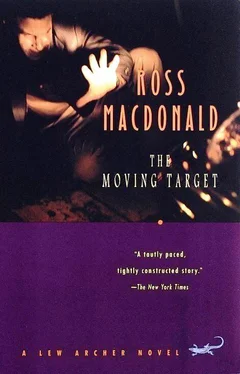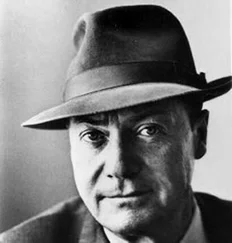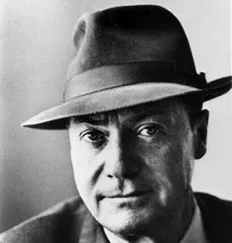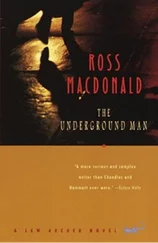Sampson’s bungalow was larger than most of the others and had more terrace. The door at the side was standing open. We passed through a hall cluttered with uncomfortable-looking Spanish chairs into a big room with a high oak-beamed ceiling.
On the chesterfield in front of the dead fireplace Taggert was hunched over a telephone directory. “I thought I’d call a buddy of mine.” He looked up at Miranda with a half smile. “Since I have to hang around anyway.”
“I thought you were going to stay with me.” Her voice was high and uncertain.
“Did you?”
I looked around the room, which was mass-produced and impersonal like most hotel rooms. “Where does your father keep his private stuff?”
“In his room, I suppose. He doesn’t keep much here. A few changes of clothes.”
She showed me the door of the bedroom across the hall and switched on the light.
“What on earth has he done to it?” she said.
The room was twelve-sided and windowless. The indirect lights were red. The walls were covered with thick red stuff that hung in folds from the ceiling to the floor. A heavy armchair and the bed in the room’s center were covered with the same dark red. The crowning touch was a circular mirror in the ceiling which repeated the room upside down. My memory struggled in the red gloom and found the comparison it wanted: a Neapolitan-type bordello I’d visited in Mexico City – on a case.
“No wonder he took to drink, if he had to sleep in here.”
“It didn’t used to be like this,” she said. “He must have had it redone.”
I moved around the room. Each of the twelve panels was embroidered in gold with one of the twelve signs of the zodiac – the archer, the bull, the twins, and the nine others.
“Is your father interested in astrology?”
“Yes, he is.” She said it shamefacedly. “I’ve tried to argue with him, but it doesn’t do any good. He went off the deep end when Bob died. I had no idea he’d gone so far in it, though.”
“Does he go to a particular astrologist? The woods are full of them.”
“I wouldn’t know.”
I found the entrance to the closet behind a movable curtain. It was stuffed with suits and shirts and shoes, from golf clothes to evening dress. I went through the pockets systematically. In the breast pocket of a jacket I found a wallet. The wallet contained a mass of twenties and a single photograph.
I held it up to the bulb that lit the closet. It was a sibylline face, with dark and mournful eyes and a full drooping mouth. On either side the black hair fell straight to the high neckline of a black dress that merged into artistic shadows at the bottom of the picture. A feminine hand had written in white ink across the shadows: “To Ralph from Fay with Blessings.”
It was a face I should know. I remembered the melancholy eyes but nothing else. I replaced the wallet in Sampson’s jacket and added the picture to my photographic collection of one.
“Look,” Miranda said, when I stepped back into the room. She was lying on the bed with her skirt above her knees. Her body in the rosy light seemed to be burning. She closed her eyes. “What does this mad room make you think of?”
Her hair was burning all around the edges. Her upturned face was closed and dead. And her slender body was burning up, like a sacrifice on an altar.
I crossed the room and put my hand on her shoulder. The ruddy light shone through my hand and reminded me that I contained a skeleton. “Open your eyes.”
She opened them, smiling. “You saw it, didn’t you? The sacrifice on the heathen altar – like Salammbo.”
“You do read too many books,” I said.
My hand was still on her shoulder, conscious of sunned flesh. She turned toward me and pulled me down. Her lips were hot on my face.
“What goes on?” Taggert asked, from the doorway. The red light on his face made him look choleric, but he was smiling his same half smile. The incident amused him.
I stood up and straightened my coat. I was not amused. Miranda was the freshest thing I’d touched in many a day. She made the blood run round in my veins like horses on a track.
“What’s so hard in your coat pocket?” Miranda said distinctly.
“I’m wearing a gun.”
I pulled out the dark woman’s picture and showed it to both of them. “Did you ever see her before? She signs herself ‘Fay.’”
“I never did,” said Taggert.
“No,” said Miranda. She was smiling at him side-eyed and secretly, as if she had won a point.
She’d been using me to stir him up, and it made me angry. The red room made me angry. It was like the inside of a sick brain, with no eyes to see out of, nothing to look at but the upside-down reflection of itself. I got out.
I pressed the bell, and in a minute a rich female voice gurgled in the speaking-tube. “Who is it, please?”
“Lew Archer. Is Morris home?”
“Sure. Come on up.” She sounded the buzzer that opened the inner door of the apartment lobby.
She was waiting when I reached the head of the stairs, a fat and fading blonde, happily married. “Long time no see.” I winced, but she didn’t notice. “Morris slept in this morning. He’s still eating breakfast.”
I glanced at my watch. It was three thirty. Morris Cramm was night legman for a columnist and worked from seven in the evening to five in the morning.
His wife led me through a living-room-bedroom combination crowded with papers and books and an unmade studio bed. Morris was at the kitchen table, in a bathrobe, staring down two fried eggs that were looking up at him. He was a dark little man with sharp black eyes behind thick spectacles. And behind the eyes was a card-index brain that contained the vital statistics of Los Angeles.
“Morning, Lew,” he said, without getting up.
I sat down opposite him. “It’s late afternoon.”
“It’s morning to me. Time is a relative concept. In summer when I go to bed the yellow sun shines overhead – Robert Louis Stevenson. Which lobe of my brain do you want to pick this morning ?”
He italicized the last word, and Mrs. Cramm punctuated it by pouring me a cup of coffee. They half convinced me I had just got up after having a dream about the Sampsons. I wouldn’t have minded being convinced that the Sampsons were a dream.
I showed him the picture signed “Fay.”
“Do you know the face? I have a hunch I’ve seen it before, and that could mean she’s in pictures. She’s a histrionic type.”
He studied the piece of cardboard. “Superannuated vampire. Fortyish, but the picture’s maybe ten years old. Fay Estabrook.”
“You know her?”
He stabbed an egg and watched it bleed yellow on his plate. “I’ve seen her around. She was a star in the Pearl White era.”
“What does she do for a living?”
“Nothing much. Lives quietly. She’s been married once or twice.” He overcame his reluctance and began to eat his eggs.
“Is she married now?”
“I wouldn’t know. I don’t think her last one took. She makes a little money doing bit parts. Sim Kuntz makes a place for her in his pictures. He was her director in the old days.”
“She wouldn’t be an astrologist on the side?”
“Could be.” He jabbed viciously at his second egg. It humiliated him not to know the answer to a question. “I got no file on her, Lew. She isn’t that important any more. But she must have some income. She makes a moderate splash. I’ve seen her at Chasen’s.”
“All by herself, no doubt.”
He screwed up his small serious face, chewing sideways like a camel. “You’re picking both lobes, you son of a gun. Do I get paid for wearying my lobes?”
“A fin,” I said. “I’m on an expense account.” Mrs. Cramm hovered breastily over me and poured me another cup of coffee.
Читать дальше












